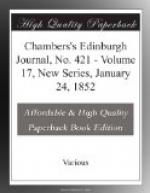The Lorenskis themselves could not but applaud that general preference. They and the travellers had become fast friends almost on their first acquaintance, which took place in the previous winter; and Count Theodore and his sister had performed a long wintry journey from St Petersburg, to celebrate the Christmas-time with them. Peasants and servants rejoiced at their coming, for they were known to be liberal. The old priest said it had never been his luck to see anything decent out of Russia before, and my uncle’s entire household were delighted, with the exception of Constantine. By and by, I guessed the cause of his half-concealed displeasure. The brother of each pair took wonderfully to the sister of the other. Count Theodore talked of buying an estate in Lithuania; and the young cousins predicted, that though Emerich and Constanza might be near neighbours, they would not live all their days free and single. After the Russians’ arrival, there was nothing but sport among us. We had dances and concerts, plays, and all manner of games; but the deep snow of our Polish winter had not hardened to the usual strong ice, over marsh, river, and forest-land. It continued falling day after day, shutting all our amusements within doors, and preventing, to our general regret, the wonted wolf-hunt, always kept up in Lithuania from the middle of December till Christmas-eve.
It was a custom, time immemorial, in the province, and followed as much for the amusement it afforded the young people, as for the destruction of the deadly prowler. The mode of conducting it was this: Every two or three families who chanced to be intimate when the ice was sufficiently strong and smooth for sledge-travelling, sent forth a party of young hunters, with their sisters and sweethearts, in a sledge covered at the one end, which was also well cushioned and gaily painted; the ladies in their best winter-dresses took possession of it, while the hunters occupied the exposed part, with guns, shot-pouches, and hunting-knives, in complete readiness. Beside the driver, who was generally an old experienced hand, there was placed a young hog, or a leg of pork, occasionally roasted to make the odour more inviting, and packed up with




